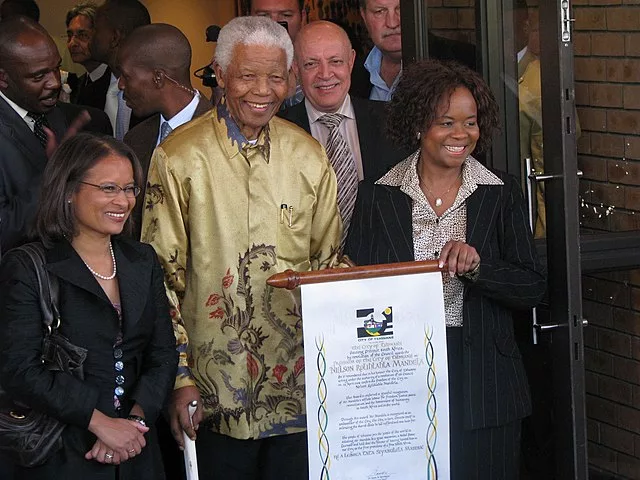“I am the grandchild of Nelson Mandela” is a common expression amongst social justice activists from South Africa. The recent case brought by the country against Israel at the International Court of Justice (ICJ) is inextricably linked to its past fight for justice and decolonisation. For many, the case is a moral beacon which challenges the Western hegemony over global politics – but what can South Africa’s history teach us about the present?
In South Africa, apartheid began in 1948. At the time, many white South Africans (‘Afrikaners’) felt that white domination was being threatened by an increasing number of black migrant workers in the country’s industrial centres; the ruling minority insisted that there should be a market for employment in which non-whites could not compete. The solution was a legislative effort to extend segregation, which had so far been the social custom, through a parliament in which non-whites could not vote. Apartheid was the legislative part of a system that exploited black labour and concentrated money and power in the hands of the white elite.
By 1964, 3 million white South Africans controlled the affairs of 11 million black Africans, 1.5 million persons of mixed blood and half a million Asians. By the beginning of the 1980s, South Africa had the highest wealth inequality in the world, with 40 per cent of the population earning just 6 percent of the national income.
Looking through the archives of The New York Times between 1960-80, there are a few key ways in which apartheid was allowed to persist until the start of the 21st century.
The first was clever marketing. Afrikaners considered their rule as akin to an objective tribunal, like the Supreme Court. The United Party, although not in favour of apartheid, argued that the role of the white government was to stand “above partisan passion and…defend minority rights, however transiently unpopular, from an excessive ‘democracy’ of a thrusting majority”. This was compounded by open fearmongering about what ‘black rule’ could mean for the country. In 1977, the Foreign Minister of Apartheid South Africa travelled to the United States to lobby Congressmen, businessmen and Senators against supporting ‘one-man, one-vote’, the slogan used by the anti-apartheid movement. The same slogan used by the civil rights movement in the United States in the 1960s, he said, would bring “violence, bloodshed and eventual destruction of the white population”.
The next was an obsession with discussing the way in which apartheid would end and detracting from the vile racism and inherent violence of white minority rule. In 1986, four years before the negotiations to end apartheid, a New York Times opinion writer wrote: “None but the glib can foresee an easy, painless transition…oppression has gone on so long that even those most patient of people, South African blacks, are now smouldering with bitterness.”
The idea that apartheid could only be dismantled through excessive violence allowed many to continue supporting the status quo, even as increasing state violence was required to maintain the apartheid regime. When 7,000 black protesters rose up in opposition to the ‘pass-book’, a government ID that defined your rights according to your race, police fired indiscriminately into the crowd and killed 69 people. UMkhonto we Sizwe (MK), the paramilitary arm of the African National Congress (ANC), was formed in the wake of this atrocity, now known as the Sharpeville massacre.
Pervading this discussion were racist narratives that suggested that black Africans were not ready to be given sovereignty and that they were too tribal, or inherently violent, to form stable societies. Many colonial enterprises relied on similar notions of stewardship, which gave Europeans the right to control African affairs. An opinion article in The New York Times in 1962 entitled ‘Africa Struggles with Democracy’ repeats long-cited ideas about the backwards, tribalistic people of the continent. Seemingly legitimate concerns about the rise of ‘strong man’ rule even suggested that Africans were somehow predisposed to it: “Now, having become the masters, they seem to many Western observers to be surrendering their new powers just as fast as they can, not to the white overlords, but to their own black leaders.”
Absent from this discussion was the fact that the white holders of power had, for the past four hundred years, undermined the rule of law and effectively precluded the formation of stable African societies. The apartheid government regularly stoked racial tensions to preserve its power, even to the end of its rule.
The final way the apartheid regime clung to power was to exaggerate claims of a greater evil. For many in the West, the “inhumanity of the South African system, its perverse racism, was a lesser evil” than the spectre of communism. The apartheid government, and its powerful allies in the United States and the United Kingdom, considered the ANC a terrorist organisation sympathetic to communism. After the United Nations published a report advocating for the establishment of a ‘non-racial democracy’, South Africa accused it of bias for drawing on sources which it considered “communist-infiltrated or controlled”.
In 1952, Nelson Mandela was imprisoned for ‘statutory communism’. He would later face charges of ‘high treason’ and ‘conspiracy to violently overthrow the government’; the latter led to his famous imprisonment on Robben Island. In 2005, 11 years after apartheid was lifted, I had the honour of meeting him. Yet, he remained on the United States terror watchlist until 2008.
It is in this spirit that one should view the moral leadership of South Africa at the ICJ. In the words of Chief Albert Lutuli, a former President-General of the ANC: “Our history is one of opposition to domination, of protest and refusal to submit to tyranny.” The struggle for national rights in South Africa has a 300-year-old history. It continues today, as economic and social apartheid is dismantled in South Africa and it challenges Western imperialism.
Decolonisation is not an easy endeavour, but history shows that it is inevitable.


